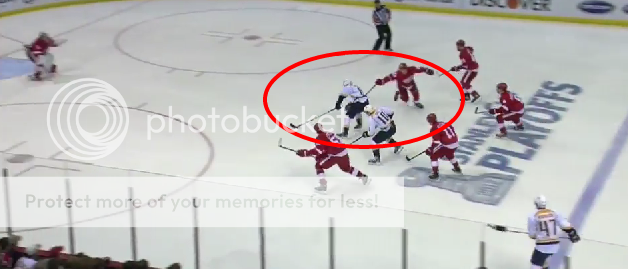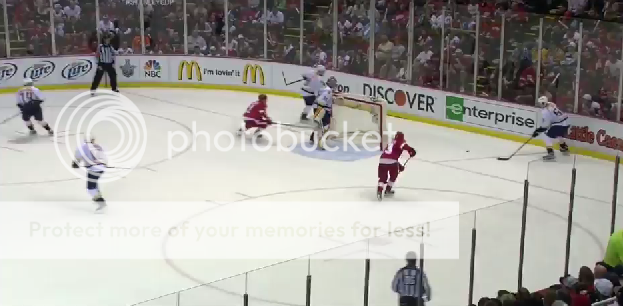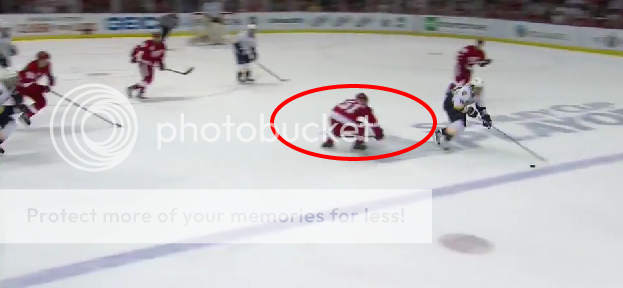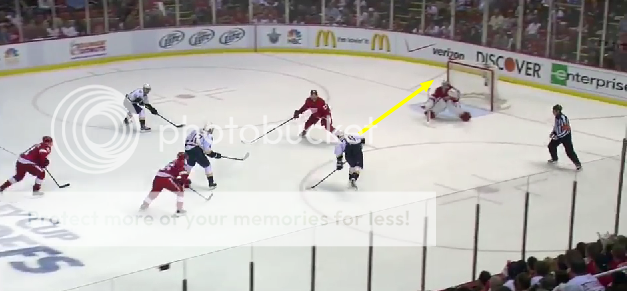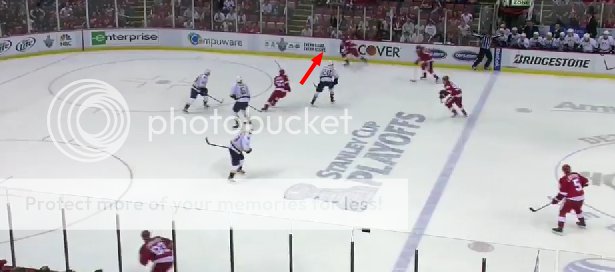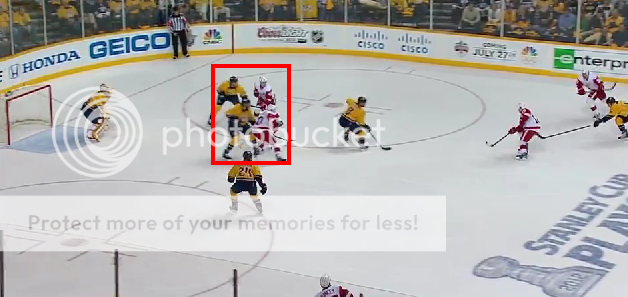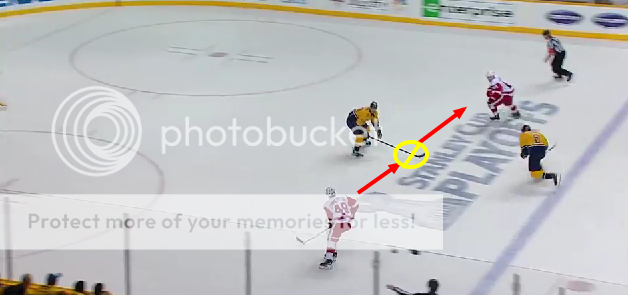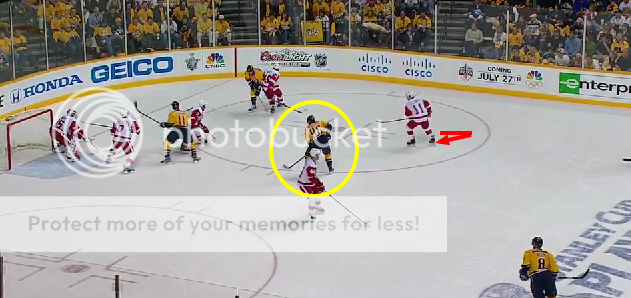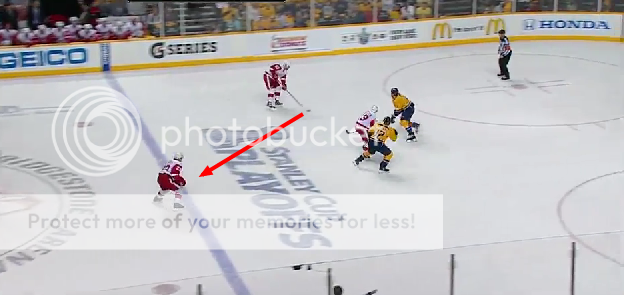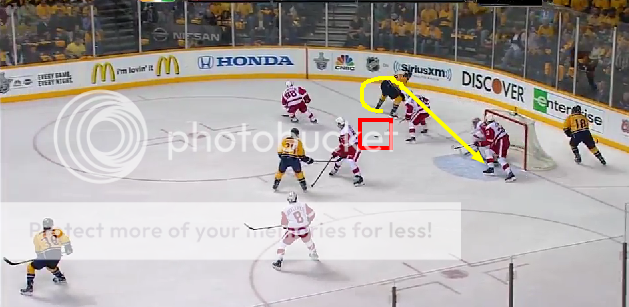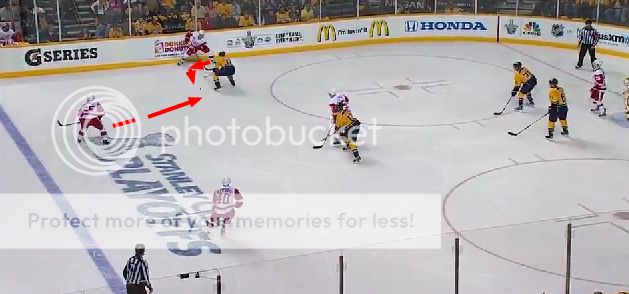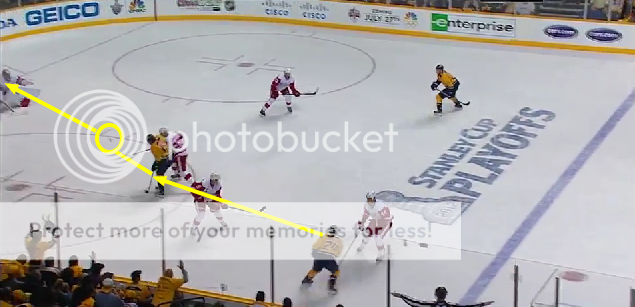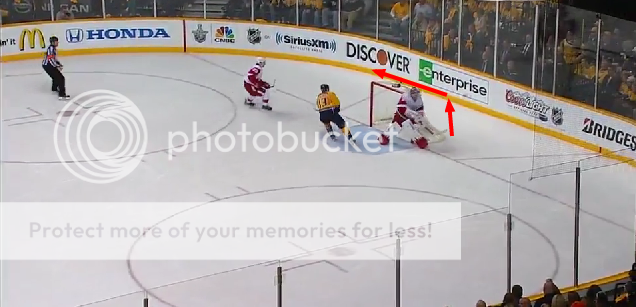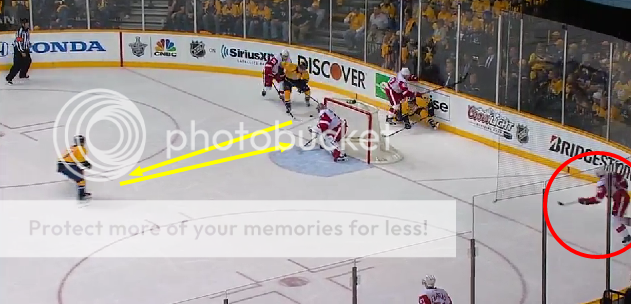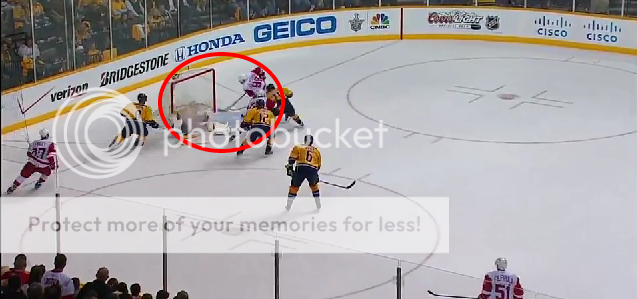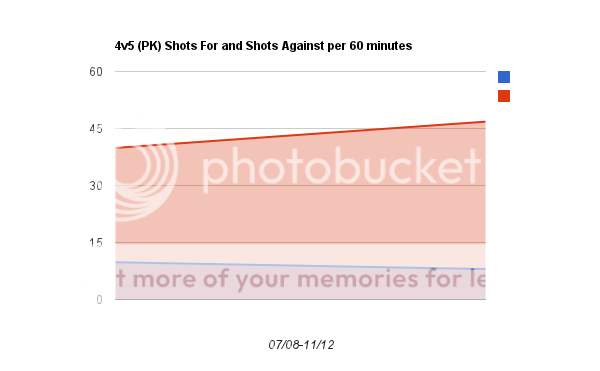Looks good in red, no?
When Mike Babcock laments the lack of forward depth, you know it's time to make some changes. When he offers to fly around the country to recruit free agents, you know that Detroit is in dire straits. Most believe that New Jersey winger Zach Parise will be near the top of the Red Wings' list of targets when July 1st rolls around, giving Detroit the additional offensive punch they lacked during the playoffs. Is Parise worth wooing, and what might it take to land him?
Let's assume that Valterri Filppula isn't moved during the offseason. That means that Detroit's top six forwards could look something like this on opening night of the 2012-13 season:
Nyquist-Datsyuk-Franzen
___?___-Zetterberg-Filppula
It may be a bit of a stretch to put Nyquist on the top line, but the chemistry he had with Pavel Datsyuk is hard to deny, and it seems silly to bury him in the bottom six with the type of playmaking ability that he possesses. This leaves one spot to be filled, and Parise could be slotted in quite nicely there. The first line has a Hart trophy caliber player in the middle, and the second line has three potential all stars. Not a bad top six.
Though he may still be playing hockey with a team that's not the Detroit Red Wings, let's take a look at what Parise could bring to the organization.
Statistical Breakdown
Basic Stats
Contract
Parise signed a one year, $6 million dollar deal in the summer of 2011 that helped avoid arbitration, but also allows him to test the waters of free agency once he has played out the season. He had a successful, if slightly subpar, regular season in 2011-12 (according to comparisons against five year averages of HARO+, HARD+, and HART+). Despite this, I don't expect Parise's paycheck to get any smaller.
I wouldn't be surprised if he signs a deal for around $6.5 million per season. The cap hit could be structured to be somewhat similar to Henrik Zetterberg's at slightly over $6 million per season. At this salary and cap hit, I'd sign Parise.
I don't see him as a part of the upper echelon of players in the league, and the comparisons above make this fairly obvious. At the same time, and all else being equal, he would have been the only 30 goal scorer on the Wings this season. He's a very talented player, someone I'd put in the same neighborhood as Zetterberg. It seems fair that they would then be paid accordingly; similar deals for a similar skillset.
The only disturbing thing that I saw when going through the numbers was that nothing really stood out on the advanced statistics side of things when comparing him to New Jersey's other forwards. While Parise almost had a 70 point year, he wasn't clearly and distinguishably the best player on his team in any one category. If the bidding for him gets out of hand, I'd let him sign elsewhere. At $7 million a season I think his contract turns into a burden despite his talent, especially keeping in mind that Datsyuk only makes $6.7 million per season and was better in most advanced statistical categories.
Estimated Contract: $6.5 million/yr
Estimated Value: $6-6.5 million/yr
Can Detroit Sign Him?
In short, yes.
Let's assume that Valterri Filppula isn't moved during the offseason. That means that Detroit's top six forwards could look something like this on opening night of the 2012-13 season:
Nyquist-Datsyuk-Franzen
___?___-Zetterberg-Filppula
It may be a bit of a stretch to put Nyquist on the top line, but the chemistry he had with Pavel Datsyuk is hard to deny, and it seems silly to bury him in the bottom six with the type of playmaking ability that he possesses. This leaves one spot to be filled, and Parise could be slotted in quite nicely there. The first line has a Hart trophy caliber player in the middle, and the second line has three potential all stars. Not a bad top six.
Though he may still be playing hockey with a team that's not the Detroit Red Wings, let's take a look at what Parise could bring to the organization.
Statistical Breakdown
Basic Stats
- Parise played in all 82 games this season, scoring 31 goals and adding 38 assists for a total of 69 points. Seven of his goals came on the powerplay, and three were short handed tallies. Average time on ice was 21:29 (16:05 even strength, 3:26 powerplay, 1:57 shorthanded).
- Took 293 shots. Blocked 39 shots. 35 givesaways were offset by 65 takeaways.
- He was a -5 on the year. Weird stat of the day: 16 of his 32 penalty minutes came from tripping calls.
Advanced Stats
- Parise's even strength Relative Corsi Quality of Competition is 0.731. Essentially, the higher the number the better the competition faced. For context, we'll look at some of the top players (by reputation) in the league. Datsyuk (1.169) and Claude Giroux (0.805) faced tougher competition, while offensive dynamos like Steven Stamkos (0.248) and Evgeni Malkin (0.279) racked up their numbers against relatively weaker opponents. An interesting case is current teammate Ilya Kovalchuk (0.533). Though Kovalchuk had 15 more points than Parise, it was Parise who was drawing the tougher defensive assignments. The closest Red Wing is Jiri Hudler (0.789), the very player that Parise could be replacing.
- On-ice Corsi rating isn't as kind to Parise, and this is true for all of his Devils teammates. Corsi measures the shot differential (goals+saves+blocked shots+missed shots) per 60 minutes of even strength ice time. Parise (3.22) pales in comparison to guys like Datsyuk (19.08), Malkin (17.69), Toews (17.17), and even Joe Pavelski (12.32), but then again the highest Corsi on New Jersey belongs to Alexei Ponikarovsky (7.84). This is likely more indicative of the system utilized by New Jersey instead of a flaw in every single player on the Devils' roster.
- Parise averages 0.99 goals, 0.71 first assists, and 0.47 second assists for 2.18 points every 60 minutes of 5v5 time he's on ice. To compare, Giroux (1.02, 1.02, 0.70 for 2.73), Datsyuk (0.82, 1.00, 0.65 for 2.47), and Malkin (1.88, 1.42, 0.36 for 3.66) all average more, but only Malkin is averaging significantly more points. For fun, let's look at the Wings' last big free agent signing, Marian Hossa. His averages (0.92, 0.92. 0.72 for 2.56) are similar to top tier players like Giroux and Datsyuk, and if Parise raised his second assist average he'd be in the same category.
- Offensive zone start percentage isn't the be-all end-all of advanced statistical analysis, but is useful in determining how a coach views a player. If a guy's offensive zone start % is low (30-40%) then he's likely being used as a defensive specialist, while a player whose offensive zone start % is 60% or above may be viewed as a defensive liability. Parise's number (54.2%) is nothing earth-shattering. He's not being shielded from having to defend, and he's not being put on the ice solely to check. This is about what you'd expect from a good two way forward like Henrik Zetterberg (54.5%) or Datsyuk (55.5%).
- Two statistics that I find interesting are +/- On-Ice/60 and +/- Off-Ice/60. The first looks at the average goals for per 60 minutes of even strength ice time and subtracts average goals against per 60 minutes of even strength ice time from it. The latter does the same for the team when a player is off the ice. Parise's +/-On/60 is -0.14, and his +/-Off/60 is -0.18. New Jersey allows 0.14 more goals than they score for every 60 minutes of even strength time Parise plays, while they allow 0.18 more goals than they score when he's off the ice. In other words, Parise's team is negligibly better when he's on the ice compared to when he's riding the bench. While this isn't the ringing endorsement of impact that a high +/- On/60 can provide, it isn't singularly damning either.
- Let's look at +/-On/60 and +/-Off/60 for Parise's powerplay numbers. His +/-On/60 is 4.75, and his +/-Off/60 is 2.68. The New Jersey offense is receiving a significant boost when Parise is on the ice with the man advantage. Keep in mind that Parise averages almost 4 minutes per game on the PP, so this is a statistic worth noting.
- Parise also plays on the penalty kill, averaging almost 2 full minutes per game. His +/-/60 numbers, however, are brutal. A +/-On/60 of -2.64 and +/-Off/60 of -0.91 is alarming enough that I dug a little deeper. Though it looks like the Devils are much worse off with Parise on the penalty kill than if they kept him on the bench, he's actually playing the second most time of any NJ forward (1.94 minutes per 60 played; Dainius Zubrus plays 1.95). He's scored three of the six shorthanded goals he was on ice for, but was also on ice for 13 goals against. I think the ice time entrusted to Parise speaks more to his skill than the +/- stats do.
- Hockey Analysis has a unique way to look at the offensive, defensive, and total production of players. Here's the abbreviated explanation from their website (the rest of the article can be found here):
Given a large enough sample size of ice time with and against players I believe that we should have a reliable rating system in which any HARO, HARD, or HART greater than 1 indicates the player is a better than average player and anything under 1 indicates the player is a below average player.
- Parise's even strength HARO+ (1.083), HARD+ (0.914), and HART+ (0.998) are all respectable and fairly close to the benchmark of 1. For comparison, we'll again look at Datsyuk (1.240, 1.404, 1.322), Zetterberg (1.366, 0.897, 1.131), Malkin (1.542, 0.898, 1.220), and Giroux (1.376, 0.920, 1.148). While all of those players have higher offensive ratings, it appears that Parise is a better even strength defender than Zetterberg and Malkin and about as good as Giroux.
- Parise's powerplay HARO+ (1.159), HARD+ (0.601), and HART+ (0.880) are similar to Zettberg's (1.024, 0.681, 0.853). Datsyuk (1.327, 2.965, 2.146), Malkin (1.345, 0.632, 0.988), and Giroux (1.302, 0.636, 0.930) aren't favorable comparisons in this instance.
- The penalty kill is where Parise shines. His HARO+ (2.406), HARD+ (0.913), and HART+ (1.660) are all much higher than Zetterberg (0.756, 0.677, 0.717), Datsyuk (0.000, 1.065, 0.533), Malkin (not used on PK), and Giroux's (0.720, 0.771, 0.745).
- Perhaps the biggest strength of hockeyanalysis.com is the ability to look at HARO+, HARD+, and HART+ over multiple seasons. Five seasons of data (2007/08-2011/12) tells us that Parise is truly a two way star. Keeping in mind that anything over 1 is an above average player, Parise's even strength HARO+ (0.976), HARD+ (1.129), and HART+ (1.052) are impressive.
- Five year powerplay HARO+ of 1.223, HARD+ of 0.894, and HART+ of 1.058 is great.
- Five year peanlty kill HARO+ of 2.929, HARD+ of 1.412, and HART+ of 2.170 is especially noteworthy.
Parise signed a one year, $6 million dollar deal in the summer of 2011 that helped avoid arbitration, but also allows him to test the waters of free agency once he has played out the season. He had a successful, if slightly subpar, regular season in 2011-12 (according to comparisons against five year averages of HARO+, HARD+, and HART+). Despite this, I don't expect Parise's paycheck to get any smaller.
I wouldn't be surprised if he signs a deal for around $6.5 million per season. The cap hit could be structured to be somewhat similar to Henrik Zetterberg's at slightly over $6 million per season. At this salary and cap hit, I'd sign Parise.
I don't see him as a part of the upper echelon of players in the league, and the comparisons above make this fairly obvious. At the same time, and all else being equal, he would have been the only 30 goal scorer on the Wings this season. He's a very talented player, someone I'd put in the same neighborhood as Zetterberg. It seems fair that they would then be paid accordingly; similar deals for a similar skillset.
The only disturbing thing that I saw when going through the numbers was that nothing really stood out on the advanced statistics side of things when comparing him to New Jersey's other forwards. While Parise almost had a 70 point year, he wasn't clearly and distinguishably the best player on his team in any one category. If the bidding for him gets out of hand, I'd let him sign elsewhere. At $7 million a season I think his contract turns into a burden despite his talent, especially keeping in mind that Datsyuk only makes $6.7 million per season and was better in most advanced statistical categories.
Estimated Contract: $6.5 million/yr
Estimated Value: $6-6.5 million/yr
Can Detroit Sign Him?
In short, yes.
It's possible, as long as Nick Lidstrom and Tomas Holmstrom are willing to take a paycut to make the team better. Let's assume the cap goes up by $3 million this offseason, which is modest compared to recent years but seems reasonable given the impending expiration of the CBA and the need to re-negotiate a deal. This hypothetical scenario leaves Quincey the odd man out, and also modestly increases Helm and Abdelkader's salaries. It also assumes the signing of another key free agent (look at the defensemen and you'll see who the next Free Agent Forecasting post is going to be about). All told, it's very fiscally possible to bring Parise into the fold.
Like it? Hate it? Let me know (and follow me) on Twitter @TOGBlog1 or by email at theoctopigarden@gmail.com
Stats via behindthenet.ca and hockeyanalysis.com. Salary cap info via capgeek.com







